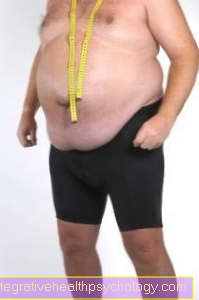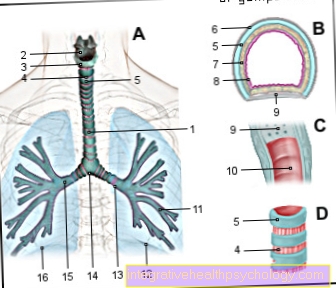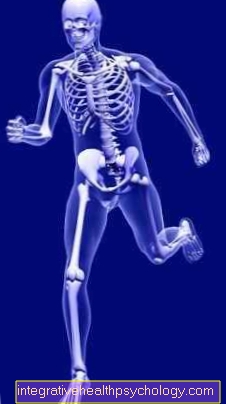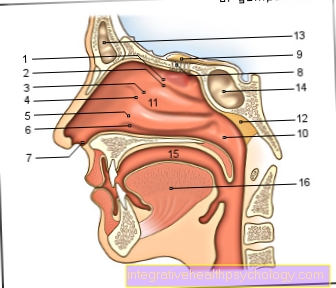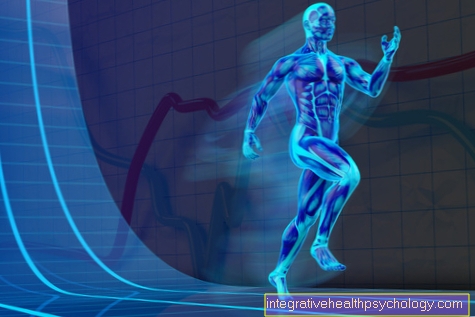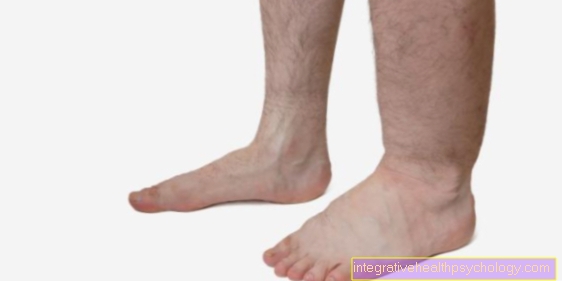Sport and fitness

Welcome to the sports medicine of !
In the following you will find an overview of our pages on the subject of strength training, endurance training, fitness & sports injuries.
Strength training based on target muscles

Strength training has different objectives. In addition to maintaining health and physical fitness, aesthetic reasons also play a decisive role. Below is a list of the various strength training programs by muscle group:
- Abs workout
- Back training
- Arm muscle training
- Leg muscle training
- Buttock training
- Chest muscle training
- Shoulder muscle training
- Neck muscle training
Strength training adapted to the physiological state

Weight training is suitable for everyone. Different methods and materials are used depending on the area of application and target group. Read more about this at:
- Strength training in childhood
- Strength training in adolescence
- Weight training for women
- Weight training for the elderly
- Functional strength training
- Weight training without equipment
Endurance training

Endurance training includes running, swimming, cycling and a lot more. You can find more information about endurance sports at:
- How can you improve endurance?
- Endurance sports in childhood
- Endurance sports at home
- The endurance sports
Lose weight

Weight loss is one of the most common reasons for exercise. Find out helpful tips on the way to your desired weight at:
- Lose weight with exercise
- Endurance sports and fat burning
- Lose weight
- Lose weight on the stomach
- Lose weight on the thigh
- Lose weight without hunger
Build muscle mass

Muscle building is the primary goal of strength training, especially for the male target group.
You can find helpful information on building muscle here:
- Exercises for building muscle
- Muscle building and anabolic steroids
- Building muscle and consuming alcohol
- Electro stimulation
- Muscle building for women
Interactive from the field of sport

How good is your muscle building? Do the self-test: How good is your muscle building training
Or do you like to quiz? Then take our big quiz on the subject of sport
Sport with risks

In various situations in life, it is important to limit or even pause physical activity so as not to endanger your own health. Information on this topic can be found at:
- Exercise with a cold
- Exercise for coughs
- Exercise for osteoarthritis
- Exercise with a prosthetic knee
- Exercise for tooth root inflammation
- Exercise during pregnancy
- Exercise after a vaccination
The most common sports injuries

Injuries or after-effects are not uncommon in sports. The most common sports injuries include:
- aching
- Muscle strain
- Muscle crack
- Bruises
- Sprains
The diet in sport
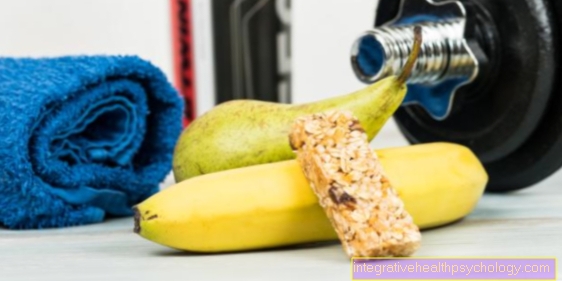
Not only sport, but also diet makes a great contribution to a healthy lifestyle. On the following pages you will find an overview of nutrition in sport:
- Diet and muscle building
- The right nutrition for strength training
- Calorie consumption during strength training
Food supplements

Dietary supplements can be taken to supplement the diet by adding nutrients. Here you will find a list of the most common dietary supplements:
- Protein shakes
- amino acids
- Creatine
- BCAA
- CLA
- Weight gainer
- Muscle building supplements
From performance diagnostics
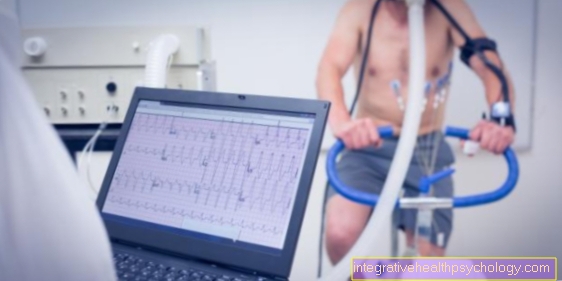
Various examinations are suitable for checking the success of training or testing your own performance. In the following you will find topics from the field of performance diagnostics & sports medical examinations:
- Ergometry
- Endurance performance diagnostics
- Pulmonary function test
- Spiroergometry
- Lactate test
About the term condition
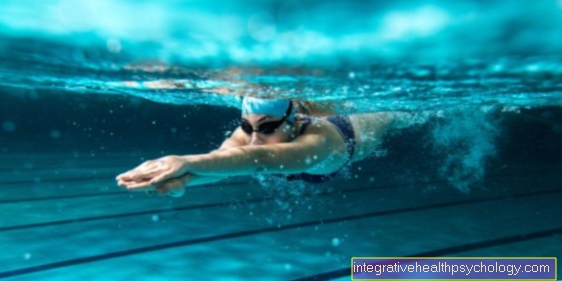
Fitness is often equated with endurance. But that's wrong. The condition (lat. for condition) includes endurance, strength, speed and flexibility. You can find more about this under: How can you build up your stamina?
More from the area of training

There are a lot of different types of training. Below you will find our articles about training:
- Altitude training
- Circuit training
- Overtraining
- Coordination training
- Fitness training
- Training principles
- EMS training
Stretching properly

Stretching is necessary to prepare the muscles for an upcoming strain and to promote flexibility. Here you can find information about stretching:
- stretching
- Stretching exercises for sore muscles
Sports medicine - what is it?
definition

The sports medicine is a Branch of medicine and includes theoretical and practical medicine. It deals with athletes as well as untrained people. Both Athletes is about rehabilitation and Prevention after an injury or else the Injury Prevention. The effects of sport on the human organism are examined and evaluated in clinical studies in order to obtain the latest knowledge.
At untrained people in sports medicine it is more about determining whether a person is suitable for sports, or any risks involved in exercising could occur. Sports have many different effects on the human body, which can be different for the untrained than for the trained athlete. Sports medicine tries that here Minimize risksso that exercising is possible for everyone.
Sports medicine is also studying the Influence of training and movement on the human body at all ages. It is usually the rule in medicine to work on a diagnosis or organ-related basis. This looks different in sports medicine, as one is more likely to favor the Importance of physical activity, health and Efficiency Interested. Especially the study of the effects of lack of movement on the human body is the focus of interest. In general, sports medicine deals with the medical issues of exercise and sport.
What does a sports doctor do?
In Germany you are allowed to be Sports medic refer to when looking for the normal medical training, after the state examination, another further education makes, which is about theoretical and practical knowledge. This includes a special knowledge about the functioning of the human body during sport, such as Sports injuries and diagnostic methods. In addition to knowledge also belongs Experience in addition, which can be collected through the supervision of associations or coronary groups, for example. The official designation of the sports medicine doctor is given by the medical association and may then be used as a title. The sports doctor, as the title is also often used colloquially, does not officially exist, but only in the vernacular.
Generally speaking, the sports medic is a specialist in sports medicine and deals with training and movement of athletes as well as with Diagnosis, Prevention, treatment and rehabilitation. The Sports injury treatment are the most common cause of seeing a sports doctor.
Sports medicine treatment areas
Sports medicine has different focuses and covers a large area of medicine. The sports doctor takes care Sports injuries, takes care of the rehabilitation and makes a Prevention for sure. He created Nutrition plans and developed Detection methods for doping use. He also examines the Influence of exercise or lack of exercise on human health and informs the general public about the importance of playing sports.
Sports injuries
As a specialist, the sports doctor is responsible for the treatment of injuries and illnesses, that arise during sporting activities, and for the prevention of sports diseases and the care of patientswho are in rehabilitation after a sports injury. Monitoring rehabilitation is here particularly important, since wrong measures may lead to incorrect healing processes.
Sports medicine treats diseases like that Tennis elbow, which causes inflammation of the tissue on the protruding bone on the outside of the Elbow be evoked. This can occur particularly during monotonous work, such as tennis or table tennis.
Bruises, Strains and Sprains often occur in team sports, but also in athletics and even less often in others sports on. These are more like "Minor" injuries, the heal very well and relatively quickly. The sports medic examines the painful area, notices a bruise and may prescribe pain medication and otherwise a lot of rest.
Broken bones occur a little less in sports medicine, but are for it usually much worse and usually need one plaster. The healing process is here through a rehabilitation supported, which the sports physician monitors and possibly carries out himself. Broken bones occur in high-risk sports, extreme sports and outdoor sports, and team sports.
Further treatment areas are Contortions, from which in worse cases Tapes- and Tendon injuries can arise. Also Muscle injuries fall into this pattern. This group of injuries can be very serious and also lead to a termination of the athletic career.The tendon injuries in particular persist for a very long time and do not heal well because the tendons in the human body have poor or no blood supply. The sports medic locates the injury and develops a rehabilitation program, that suits the patient / athlete and guarantees the best possible recovery.
Investigation of the influence of movement on humans
Another great field of sports medicine is that Investigation of the influence of sport on the body, on sick people, such as Sedentary lifestyle. Sport always causes an adjustment process in the body, which can vary in strength depending on age, gender and performance. Which processes take place in the body, is the subject of sports medicine and there are always new discoveries that change and improve training and movement. In sick people, exercise can lead to a Improvement of health lead, if a sports doctor has previously examined in detail which sport could enable the patient to improve and which sport is more of a risk.
Sedentary lifestyle leads in the long run to a Deterioration in health and can do the so-called Common diseases diabetes and chronic back pain favor. It applies here to prevent this development and to draw up a sports plan. In addition, the sports medic should clearly inform the patient on the risksthat brings with it another lack of exercise, Clues. Sports medicine can therefore also influence the development of common diseases and lack of exercise and increase the general health of the population. Diseases of the cardiovascular system are also part of it and are treated by sports medicine, but above all also prevented. The sport itself benefits from the new findings, as new findings make sport and moving safer.
The real importance of sports medicine is not the competitive sports care, but the prevention and health sport. This area refers to the Recreational and popular sportswhich continues to grow in Germany. Health and athleticism are increasingly important factors in society. In this context, sports medicine is also constantly developing and gaining new knowledge. Sports medicine wants to inform people and inspire and sensitize them to the importance of sport and movement. The goal should be higher participation in sport, such as a healthier lifestyle and a balanced diet be. The positive effects that body and mind experience through sport also increase mental performance, strengthen character and inner peace and balance.
Nutrition and doping
Another field of sports medicine is that Sports nutrition. These include Nutrition plans, Food supplements and also illegal substancesthat come under the term doping fall. Nutrition plans support the body in that Formation of new muscles and support the metabolism. The sports doctor creates the plan depending on the athlete's performance level, age and sport. This can increase the level of performance a little.
Food supplements are mainly used in professional sports. Here an attempt is made to support the body at the right moment with concentrated nutrients to guarantee better development.
On the subject doping tries sports medicine on the one hand research the effects of illegal substances and so the athletes protect from use. On the other hand, sports medicine is developing methods to detect doping substances and such limit use, such as Convict doping offenders.
Sports medical examination
The purpose of these examinations is to find out whether the Cardiovascular system, the Musculoskeletal system and the entire organism of the patient / athlete everything is in order. The sports medical examination enables a optimal fitness manufacture and reduces health risks.
In addition to the sports medical examination, the sports doctor also explains which sports can be practiced with a clear conscience and which sports are more likely to pose a health risk. The patient is also informed about the amount of exercise in order to slowly approach his target fitness level.
The basic investigation in sports medicine includes first one anamnese, in which the patient questions about his life, his sporting history, possible injuries and complaints and Family diseases must answer. The sports doctor tries to get to know the patient as best he can and thus to ensure healthy exercise.
The medical history is usually followed by one Survey of the whole body status. This includes height, Weight, Body measurements and a so-called Body biometrics. All data of the body (body fat, Water content, Muscle composition, Bone structure etc.) in order to discover and localize any imbalances or misalignments.
A Resting ECG enables the sports doctor to make specific statements about the Circulatory condition hold true. The resting heart rate shows how well trained an athlete is. The lower the resting heart rate, the better the athlete is trained and the better they work heart and circulation.
If you want to do sports, you should undergo a sports medical examination beforehand to rule out certain risks. As a rule, health insurance companies pay a share of the price of the examination. An extended examination usually costs more than 100 euros, whereas an Basic investigation for under 100 euros is to get.


